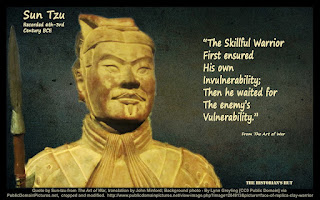Throughout history, there have been many leaders who have demonstrated remarkable strategic genius on the battlefield. From ancient times to the modern era, these individuals have been able to outwit and outmaneuver their opponents, often against seemingly insurmountable odds. Here are the top 10 most ingenious strategists in history:
1) Sun Tzu: Sun Tzu was an ancient Chinese general and military strategist who lived during the Eastern Zhou period. His book "The Art of War" is still studied today and is considered one of the most influential works on military strategy ever written. In it, he emphasizes the importance of knowing oneself and one's enemy and provides valuable insights into the nature of war and the principles of a successful strategy.
2)Julius Caesar: Julius Caesar was a Roman general and politician who played a key role in the transformation of the Roman Republic into the Roman Empire. He was known for his tactical genius on the battlefield, as well as his political savvy. He expanded the Roman Empire through conquest and diplomacy and is credited with introducing new military tactics and reforms that influenced warfare for years to come.
3) Napoleon Bonaparte: Napoleon Bonaparte was a French military leader and emperor who rose to power during the French Revolution. He won numerous battles and expanded the French Empire, introducing innovative tactics such as the use of artillery and the corps system. He also implemented administrative and legal reforms that shaped modern France.
4) Alexander the Great: Alexander the Great was a Macedonian king and conqueror who conquered much of the known world by the age of 33. He was known for his tactical genius and his ability to adapt to changing battlefield conditions. He introduced new military tactics such as the phalanx and used them to great effect against his enemies.
5) Genghis Khan: Genghis Khan was the founder of the Mongol Empire and a skilled military strategist who employed unconventional tactics to defeat his enemies. He built one of the largest empires in history and introduced new military tactics such as the use of cavalry and the Mongol bow. He also implemented administrative and legal reforms that shaped the Mongol Empire.
6) Hannibal Barca: Hannibal Barca was a Carthaginian general who fought in the Second Punic War against Rome. He is remembered for his daring military tactics, including his famous crossing of the Alps with elephants. He is considered one of the greatest military strategists of all time and is credited with introducing new tactics such as the double envelopment.
7) Khalid ibn al-Walid: Khalid ibn al-Walid was a Muslim general and companion of the Prophet Muhammad who played a key role in the early expansion of the Muslim empire. He won several crucial battles against the Byzantine and Sassanid empires and is known for his military prowess and tactical brilliance.
8) Takeda Shingen: Takeda Shingen was a Japanese feudal lord and military commander who lived during the Sengoku period. He is known for his tactical brilliance and innovative military strategies, including the cavalry charge. He was a formidable opponent on the battlefield and played a key role in shaping the history of Japan.
9) Subutai: Subutai was a Mongol general and military strategist who played a key role in the Mongol conquests of Asia and Europe. He is considered one of the greatest military commanders in history, having won over 20 major battles and conquered vast territories for the Mongol Empire. He introduced new tactics such as the feigned retreat and is known for his strategic vision and ability to outmaneuver his opponents.
10) Vo Nguyen Giap: Vo Nguyen Giap was a Vietnamese general and military strategist who played a key role in the defeat of the French and American armies during the Vietnam War. He is credited with developing guerrilla warfare tactics that proved highly effective against more conventional military forces. He also played a key role in shaping the history of Vietnam and is considered one of the most important figures in modern Vietnamese
These are just some of the most ingenious strategists in history, each of whom has left a lasting impact on the art of war and the course of history itself. While their methods may differ, their strategic brilliance and ability to outmaneuver their opponents remain an inspiration to military commanders and strategists to this day.

Comments
Post a Comment